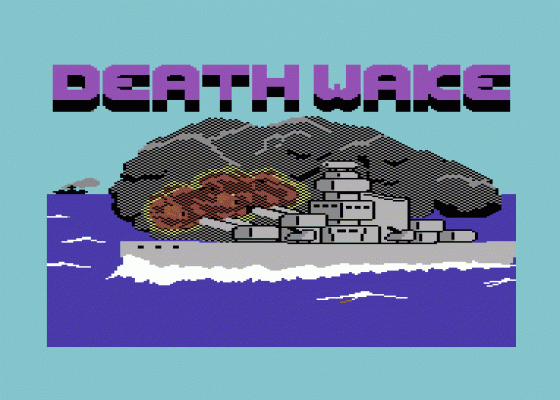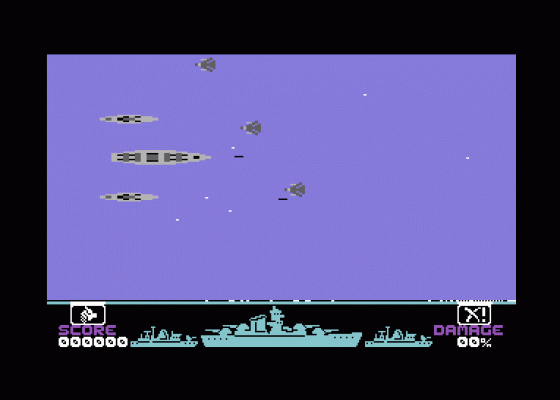
Zzap
 1st March 1986
1st March 1986
Categories: Review: Software
Publisher: Quicksilva
Machine: Commodore 64
Published in Zzap #11
Deathwake
Deathwake is a sort of Beach Head I/II type game which hurls you into a war situation. In the tradition of all true 'war hero' storybooks, you are completely outnumbered as you take on the entire enemy force single-handed.
The story goes like this: the enemy hold vast areas of the homeland in the north and west and are one step away from completing research which will give them the atomic bomb. Needless to say, if they make The Bomb, the war will not continue for very much longer...
Allied attempts to destroy the research plant have failed, owing to the fact that it is built into the side of a mountain, deep inland along a narrow inlet. Air attacks have proved useless and there have been no survivors from the three commando raids. There's one hope remaining - you, the Captain of the battleship Undaunted.

Research has shown that it is possible to enter the narrow inlet and destroy the plant by firing upwards under the protective shield of the mountain. However, this is a task of epic proportions and the odds are stacked against you as you prepare for the voyage.
The game is broken up into several different arcade sequences like Beach Head, with between-screen air attack phases. Here a map is shown of both the allied and enemy territory, along with all the airfields, radar stations, ports and so on. What the player has to do is try to take out as many enemy emplacements as possible by allocating targets to his own airfields. Once the targets have been selected, the aircraft can be scrambled and sent on their missions. The computer decides the damage caused, shows the results and then puts the player into an arcade sequence.
The first of these sequences is an attack from enemy aircraft. The Undaunted and her two escort ships must thwart wave after wave of torpedo-dropping aircraft by shooting them down. The ships and planes are viewed from above and a Missile Command type cursor is used to target the shells from the ships. When an aircraft gets near to the ships it drops its torpedo, which has to be avoided otherwise the ship sustains damage. The two escort ships a re dispensable and are lost if one torpedo hits them. The Undaunted, on the other hand, can sustain three hits before she sinks - just as well as she's vital to your mission.

If the player manages to get past this screen then another air attack phase follows. The next arcade sequence is a 3D view from The Undaunted and puts you under fire from patrol boats. These move along the horizon, turn and sweep towards you before releasing their torpedoes. The only way to survive this screen is to sink the patrol boats before they launch their torpedoes. This is done by using your guns which can be moved up, down, left and right.
The third screen is another view from above, only this time the player has to guide The Undaunted through a minefield - a collision with a mine and the game ends.
Finding the correct elevation is the key to the fourth screen, as you try to sink the three battleships blocking the entrance to the inlet. Whilst you're doing that they're busy pounding you with shells, so speed is again of the essence.
If you manage to survive that onslaught, then enemy planes are again scrambled in a last gasp attempt to stop you before you reach the base. The same principles apply to that of the first arcade screen and successfully avoiding torpedoes and shooting down the planes ensures your progression to the final screen.
This is very similar to that of Beach Head. Again getting the right elevation wins the day; this time the player has to get a shell through the doors of the research plant before they close - not an easy task by any means, but then winning a war single-handed never is.
JR
This more up-to-date Beach Head is great fun to play and offers quite an addictive challenge to any budding battleship captain. The graphics are fine - nothing flash but they fit the game nicely and are better than those of Beach Head. This is the sort of game which offers instant appeal but may pall after a while since there are only five screens. It's well priced at £7.95 and is worth taking a look at if you're into shoot-'em-up/sink em downs.
GP
Although I never thought that highly of Beach Head when it first appeared back in 1983, it must be said it was, and indeed is, a damn sight better than Death Wake, which has many similarities to US Gold's aforementioned classic. I found the six arcade sequences very monotonous to play and in fact as far as I can see there are only three truly different screens. I'm sorry to appear so cynical, but dull is far too interesting a word to describe this game.
GL
Deathwake seems to be highly derivative of US Gold's first big hit, Beach Head. The scenario and approach to the game is very similar to the Stateside hit, even though only a couple of screens bare any resemblance to the Bruce Carver's creation. In all, five different sheets are provided and, though offering a modicum of challenge, it seems likely that given a little bit of time and practice any gamester should be able to crack them; not very good for long term appeal then. Graphically, Deathwake is not astounding, adequate is a word that springs to mind, and looks a little bit antiquated compared with toddy's digital masterpieces. If this type of war game does appeal to you, then Deathwake should provide quite a reasonable amount of entertainment, though it seems likely to prove dull for anyone else.
Verdict
Presentation 79%
Jolly high score table and well presented overall.
Graphics 68%
Tiddly, but quite nice sprites which fit the game well.
Sound 36%
Dakka dakka booooom.
Hookability 72%
Progressing from screen to screen is challenging and proves to be enjoyable.
Lastability 63%
A reasonably difficult game, although it only has five screens.
Value For Money 66%
Cheap(ish), although the scenario is a bit passe.
Overall 66%
Despite some disagreement on the team, considered worth trying if you're a warmonger.
Other Reviews Of Death Wake For The Commodore 64
Death Wake (Quicksilva)
A review by Ken McMahon (Commodore User)


